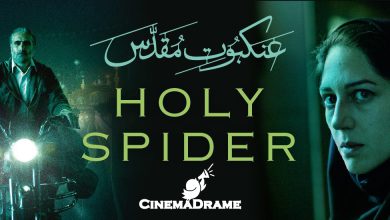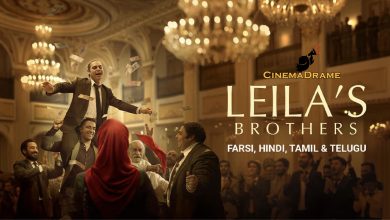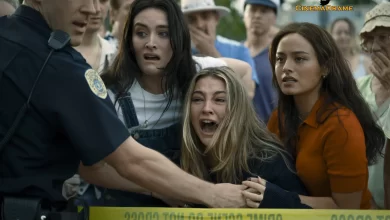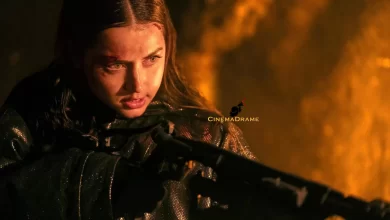The platform of your competitions lacked fairness!
Sahebe Pooyan Mehr – Film and Television Critic
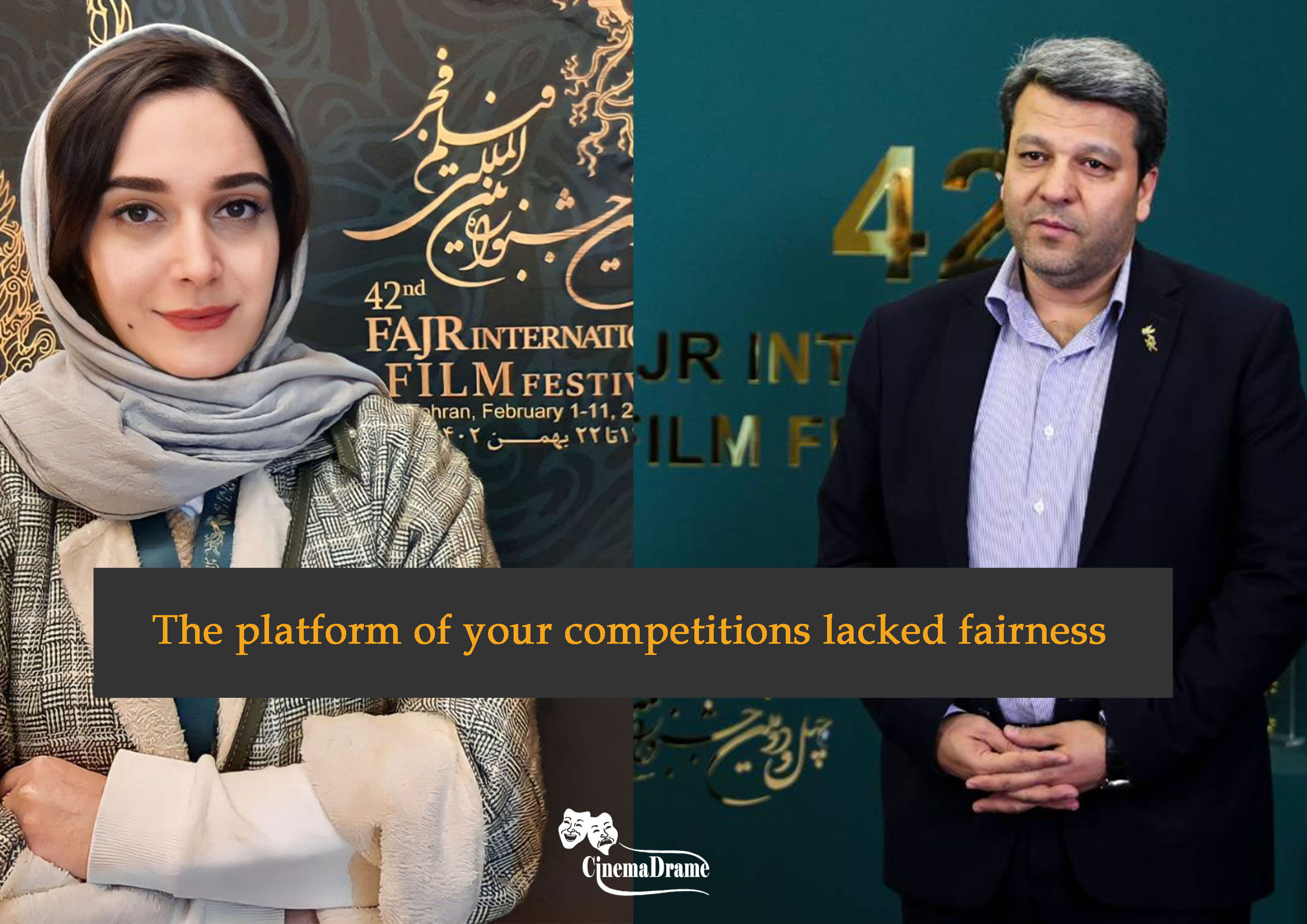
Exclusive to CinemaDrame: The more I organize my thoughts, the more I find myself overwhelmed with endless grievances. The world of art stands innocent yet abandoned, and if no one steps in to save it, it will collapse.
Dr. Esmaeili and Mr. Amini, along with a large group of artists, we spent the festival days with you. Let’s not pretend you spent more than two months selecting films. Two months is sixty days. If the selection committee reviewed even two films per day, they wouldn’t have arrived at such choices.
Mr. Khazaei stated in his speech that some sought to create division during the festival, separating the private sector from others and so forth. But were you yourselves committed to these frameworks during the selection process? If so, and there was no personal bias involved, then please explain the exclusion of Bodiless and Breakfast with Giraffes. My grievance is not just about the disregard of these two works but rather about the lack of balance.
In total, 33 films were screened. Among them, four animations and several other films geared toward children and youth were included, each individually successful and commendable. However, do you think their participation in the festival was fair to them? Let me explain the depth of the issue with an example: how did you place the excellent Kianoush’s Garden alongside the exquisite Ahmad and judge them together? Are the competition and evaluation criteria for these two works, created for entirely different spaces, the same? How could the performances of children, many of whom shone brilliantly, be ignored?
To the esteemed festival selection committee, executive team, and judges, my point is clear: the competition environment was not fair, and it’s astonishing that such an important point was overlooked by experts.
We should strive to ensure that each work is analyzed within its appropriate category.
Allow me to speak candidly about judging. Have you ever seen someone go to a general practitioner for heart surgery? I say this because art, in all its disciplines, demands the same level of expertise. I understand that a director often has hands-on experience in many areas, but their specialization is specific. Why shouldn’t the Crystal Simorgh for Best Makeup, Music, or Editing be reviewed and awarded by someone who is an expert in that field? The absence of specialized judges in various categories was glaringly evident.
Personally, I hold great respect for all artists who come together to create a work that conveys a clear message. However, the failure of a project to succeed and its subsequent criticism should not be mistaken for malice or insult. I am deeply curious to know which criteria were used to evaluate The Morning of the Execution, leading to its Best Director award. In this film, aside from the compelling performance of Mr. Arastoo Khosh-Razm—who delivered the script’s long, unengaging dialogues with a masterful command of tone and facial expressions, likely honed through years in theater—I found no other redeeming qualities.
Mr. Afkhami, you took the stage and, through your speech, mocked us. That’s fine, but as a veteran of this field, let me ask: did you watch films like Ahmad, Parviz Khan, West Sky, Majnoon, Breakfast with Giraffes, Bodiless, and Alligator Blood, which were placed in the wrong category? If you did, and you proudly received your Simorgh, then accept my congratulations!
We, the younger generation, with empty pockets, have spent long years without pay, committed to our passion and talent. This is our choice, and we have no complaints about the hardships we endure because we follow our hearts. The film The Projectionist is a clear example of the challenges faced by an artistic group starting their professional journey to create a work. Its tone is comedic, but is there anything more real than humor?
When a truly commendable film, whose lead actor undoubtedly deserved the Crystal Simorgh for Best Actress, is excluded from the competition, it sends a message of disregard for the hard work of artists. Decisions like these only create divisions. Remember, we have highly intelligent audiences. They are the primary critics. By the way, is there a specific reason for removing the audience choice award?
I don’t know about you, but the creators of a work understand better than anyone else that the audience’s opinion is more valuable than the entire budget allocated to a project. Discussions about budgets and related matters have already been brought up by other critics and colleagues, so I won’t delve into that contentious issue, as it opens countless unresolved doors.
Film festivals are a serious matter for us, the art community. The Simorgh can be a significant goal for any artist. It used to be that way in previous years. The point is that a work either deserves the Simorgh or it doesn’t. Let’s set aside formalities so that everyone perceives the competition for awards as serious and challenging. That way, when they receive it, they laugh from the heart, not because they feel obligated to smile.
I also believe there should be appropriate recognition for those who are the lifeblood of Iranian cinema—our veterans—in appreciation of all their efforts. The absence of a special acknowledgment for Master Ali Nassirian, who graciously took on a role in children’s cinema, was deeply felt. Alas, such negligence, especially from the experts!
Our cinema boasts films of global acclaim. Please, don’t offer us scrambled eggs when we’ve had kebabs. The exclusion of expertise results in the decline of film quality. For an event of such importance, do not overlook the giants of the art world. Call upon the experts; save cinema. We do not intend to offend; we have witnessed the decline and feel the pain.
It hurts to see someone create a film without adhering to the fundamental principles of a screenplay and still be nominated. It hurts for works that were unfairly placed in the wrong competition and later responded to criticism with respect—like the director of Snail Hunt. And it’s heartbreaking that the outstanding performances of children in social films went unnoticed. If only there were a Simorgh for the exceptional talent and artistry of Ryan Sarlak, who carried much of the film That Summer on his shoulders.
As someone who has spent years watching festival films, I believe the only works that could have competed alongside each other, with some leniency for a few films, include:
Breakfast with Giraffes, Alligator Blood, Ahmad, Parviz Khan, Bodiless, West Sky, Majnoon, Light Blue, The Projectionist, and Parvin’s Miracle.
To the Minister and the Festival Director, despite all my criticisms—many of which echo the sentiments of my colleagues—I thank you for including Ms. Mitra Zolfi in the music group, where she performed the cello on stage. This act, in a time when concerts in some cities are canceled due to the presence of women, was truly commendable.
Here’s to a vibrant and professional cinematic future.

